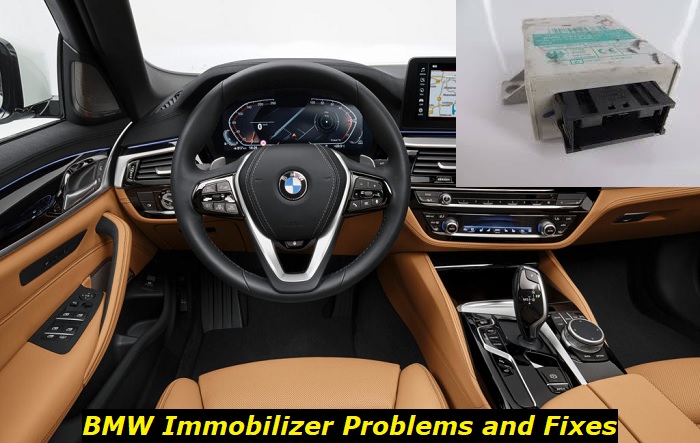BMW is a brand that millions of people around the world admire. It is a brand associated with classiness, luxury, and safety. To get a BMW means you have stepped into an organization where traveling in style is non-negotiable. But like every machine, your BMW can develop or experience issues that might prevent it from performing optimally.
No-start problems highlights
- Level of urgency:high
- DIY inspection:possible but complicated
- DIY repair:impossible
- Can you drive?no
- Price for repairs:$200 - $450
- Symptoms:engine won't crank, light may or may not go on
- Ways to solve:check the battery, check the key fob, find a good mechanic

Understanding the BMW immobilizer
A car immobilizer is an electronic device fitted in cars to enhance your safety and convenience. An immobilizer will prevent your BMW engine from starting unless the right key or fob is used. Installation of immobilizers has been lauded for having reduced car theft by up to 40%.
Too much TV can make one think hot-wiring a car is a grade school art. The car immobilizer is installed to prevent anyone from hot-wiring your BMW. If the wrong ignition key, whether physical or fob key, is used to start your BMW, the ECU will stop the fuel flow, making the engine unable to start. In some instances, your car might start and then stop soon after.
Once the ECU has established the wrong key has been used to start the engine, it will disable the fuel pump, ignition coil, and injectors. For diesel cars, the ECU will block the 'stop' relay hence blocking fuel from being injected into the engine. In certain BMWs, the ECU will also lock the steering wheel.
Starting in January 1998, all German-made vehicles had to have an immobilizer. This made German made vehicles safer and much harder to steal. Earlier models allocated a single code to your ignition key, and the ECU was to read this code. In recent BMWs, rolling codes prevent anyone from copying the code either from the ECU or key.
The car immobilizer has been instrumental in making your BMW safer and more modern. If the car doesn't start for any reason, you will need to make a proper diagnosis to establish where the problem lies. One thing to keep in mind is that if you lose your car keys, you can only get a new key from a BMW dealership. Such a key will need to be programmed to match the vehicle's immobilizer.
Common BMW immobilizer problems
Like every other car part, the BMW immobilizer can develop issues that can leave you stranded and frustrated. However, BMW immobilizer issues are not widespread. As a BMW owner, you will likely never encounter immobilizer issues. Here are some of the immobilizer issues you might encounter;
Bad electrical wiring - The immobilizer communicates with the ECU and the ignition. If the wiring between these parts is wrong or damaged, the immobilizer won't work as designed. The wiring harness between the ECU and the immobilizer can get damaged and can cause the wires to corrode, loosen or cut.
Damaged antennae - The ring antennae can get damaged, making it impossible for the key to send the signal to the immobilizer. The damage to the antennae though rare has been known to cause a leading cause of immobilizer malfunction. The error code stored for this problem or wiring issue is B1722.
Loss of EWS synchronization - Your BMW is equipped with an EWS immobilizer which serves as a control module and prevents the theft of the car. If the EWS malfunctions, you will be in serious trouble because you cannot start the car. The main reason why the EWS acts up is due to de-synchronization. Replacing parts in the electrical system, chip customization, and dead battery can lead to immobilizer synchronization issues.
Symptoms of a faulty immobilizer
The immobilizer plays a crucial role in the ignition process of your BMW. A malfunction of this component can leave you stranded. In most instances, you will find drivers blaming the starter when the vehicle won't start. But some simple symptoms might help you know if it is the immobilizer with the issue.
The engine does not start - The leading symptom of a failed immobilizer is when the engine fails to start. If the immobilizer is faulty, the ECU blocks any ignition attempt to block any theft attempt. There are countless reasons why the engine might fail to start. However, a diagnosis should help you rule out the other possible causes.
Unfortunately, if you suspect your BMW immobilizer is faulty, there is nothing much to go forward with. When you turn on the ignition key or press the fob key to ON, the cluster lights will illuminate just fine. There is no immobilizer warning light or an EWS fault light on the dash. The best you can do is diagnose by the deduction method, where you tick off all the items that can prevent the engine from starting.
How to diagnose a faulty BMW immobilizer
Establishing what is wrong with your car when it fails to crank is not easy. This is because there are a number of components and factors that can prevent your BMW from starting. To get the best picture, you should conduct a simple diagnostic test.
Check the fob key battery - Most of the time, the engine will fail to start because of a simple thing, such as forgetting to replace the fob battery. However, you can tell if the fob key battery is dying because the operating range reduces over time. You will also have difficulties locking and unlocking the doors.
A damaged or decoded key chip - BMW cars have had an anti-theft feature for many years where a chip is included in the ignition key. This chip comes with a code that can either be static or rolling. This chip communicates with the immobilizer when you turn the ignition key. If the chip is faulty or the key is not for that car, the EWS will stop the ignition process.
Hot-wire the starter - This should be done by an expert who will hot-wire the starter to rule out a starter problem. In this case, the starter will start, but the engine will not kick in, or it will start and then die after a few seconds.
Use an OBD scanner - Turn the car on and turn on the scanner and decode the VIN of the vehicle. Once the scanner has decoded the VIN of your BMW, it now becomes easy to read the parts and systems of the car. You will then be prompted to turn off the ignition for about 10 seconds. You should then press 'Drive' followed by 'control unit' to lead you to a different page where you should press 'EWS vehicle immobilizer'. If the immobilizer is the faulty link in the ignition cycle, any one of the following will have a 'YES' value under the 'live data' page;
- Starter motor blocked due to P/N
- Starter blocked due to 'Cent-l. doub-locked'
- Starter blocked due to BC code
Confirm EWS and the key are properly synched - Use an OBD scanner to establish whether the EWS and the key are synchronized. The OBD scanner will allow you to confirm this or to synch the key and the EWS.
Establishing whether the immobilizer is faulty can be tricky for a DIYer. This is because several things can cause the vehicle not to start and without the right tools and skills, you might not be able to diagnose the actual problem. Dismantling the immobilizer should be a last resort after confirming that every ignition component works.
How to fix BMW immobilizer problems
In most dealerships, a faulty immobilizer can only be replaced but not repaired. Your BMW immobilizer module is specifically coded and locked to your car, and you cannot use a second-hand immobilizer or an aftermarket one. The solution is to buy a new unit.
Replacing an immobilizer is a costly undertaking, and it comes with a lot of inconveniences. The immobilizer must be properly coded and locked to the vehicle to be fully functional. A professional BMW expert should do this to prevent you from running into future ignition issues.
There are experts out there that offer immobilizer repair services. If the immobilizer is repaired, it is unnecessary to code it again. However, the unit has to be thoroughly bench tested to ensure the problem is fully sorted.
Conclusion
An immobilizer is a crucial module in your BMW, and its malfunction can literally leave you stranded and frustrated for days. The gadget is central to your car's anti-theft system; any tampering done on it will cause the system to shut down. This is why you should seek professional help to establish whether the immobilizer is really the one faulty or some other ignition component. The good news is that immobilizer problems are uncommon, so you are unlikely to encounter them repeatedly with a single BMW.
About the authors
The CarAraC research team is composed of seasoned auto mechanics and automotive industry professionals, including individuals with advanced degrees and certifications in their field. Our team members boast prestigious credentials, reflecting their extensive knowledge and skills. These qualifications include: IMI: Institute of the Motor Industry, ASE-Certified Master Automobile Technicians; Coventry University, Graduate of MA in Automotive Journalism; Politecnico di Torino, Italy, MS Automotive Engineering; Ss. Cyril and Methodius University in Skopje, Mechanical University in Skopje; TOC Automotive College; DHA Suffa University, Department of Mechanical Engineering






Add comment